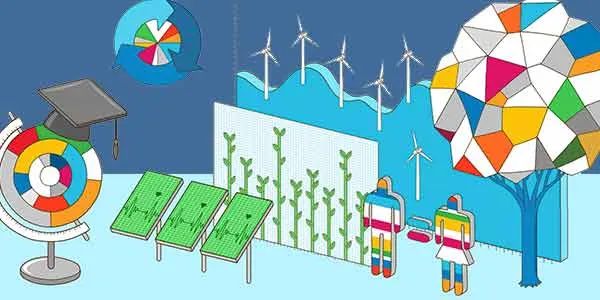Analyze & understand societal impact research with SciVal

What is your university’s role in Societal Impact?
Increasingly, university leadership, governments, funders, the community, and more are demanding to understand university research's value. They want to know that the significant investment into research is going to help society.
A university can contribute to societal impact in multiple ways. For example:
Interventions to target hunger among students and staff – for example, provide access to food banks
Building standards to minimize water use
Track application and admission rates of under-represented groups
Societal impact guide
Learn about what societal impact and the UN SDGs mean to your university.

According to a QS blog post, universities are responsible for advocating for the importance of the UN Sustainable Development Goals (SDGs). They are many ways they can do this, including with their research.
Provide research knowledge, innovations and solutions towards achieving the SDGs. As universities tend to receive private and public research funds to directly and/or indirectly solve world issues, universities are responsible for providing the in-depth academic and vocational training needed to achieve the SDGs.
Understanding your university’s research through a United Nations Sustainability Goals (UN SDG) lens
In 2015 the United Nations (UN) announced the 2030 Agenda for Sustainable Development and was subsequently adopted by all UN member states.

The UN defined 17 individual SDGs.
Seeing your institution’s research for each of these SDGs helps you understand this vital way you contribute to societal impact.
To understand more about a university’s role in societal impact and the United Nations Sustainable development goals, visit our research leaders’ guide.
Benchmark
Wageningen University & Research is located in the Netherlands. This university has produced the most research related to SDG 2: Zero Hunger.

The top worldwide academic institutions in SDG 2: Zero Hunger (per SciVal).
Imagine that the university wants to know how they compare with other European universities on research about zero hunger. They can use SciVal benchmarking capabilities to compare themselves to the top five European universities.
Benchmark by scholarly output
Benchmark the top 5 European institutions by scholarly output for SDG 2: Zero Hunger (per SciVal).
It is interesting to see that they have led the research on zero hunger in their region for several years, but that all of the universities are continuing to publish more, and some at a higher velocity.
Benchmark by FWCI
Benchmark the top 5 European institutions by Field-Weighted Citation Impact for SDG 2: Zero Hunger (per SciVal).
It is also reassuring to see that their Field-Weighted Citation Impact (FWCI) is generally high – consistently above 2.0.
Top authors
Turning to another area, looking at SDG 15: Life on Land, in South America, you can see that the University of Sao Paulo (USP) is the top producer.

The top South American Institutions by document count for SDG 15: Life on Land (per SciVal).
From this point, you can also see who at USP has produced the most about life on land in South America.

The top South American authors SDG 15: Life on land (per SciVal).
Dr. Pedro Henrique Santin Brancalion is the top USP and South American author about life on land. With this information, you can use SciVal and Scopus to find out more about Dr. Brancalion.

SciVal overview of Dr. Pedro Henrique Sanin Brancalion collaboration.
From here, you can see that most of Dr. Brancalion’s research is collaborative. There are many benefits from collaborative research; in general, it is a good indicator.
Top corporations
You can view the top companies publishing on SDG 15.

Global top industry partners publishing on SDG 15: Life on Land.

South American top industry partners publishing on SDG 15: Life on Land.
Topics
Another way to look at research is to understand the Topic it covers. A Topic is a collection of documents with a common focused intellectual interest. Publications are clustered into Topics based upon a direct citation analysis. Learn more about Topic Prominence in Science.
There are approximately 96,000 topics in SciVal.

Dr. Brancalion’s most prominent topic of research is Forest Restoration; Tropical Dry Forests; Natural Regeneration topic.
In SciVal, you can see that he publishes the most on the Forest Restoration; Tropical Dry Forests; Natural Regeneration Topic. This Topic is promising since it’s in the 97th prominence profile. In general, this indicates that the Topic has a lot of momentum and is unlikely to die out soon.
You can also see other institutions publishing on this Topic.

The top global institutions researching this Forest Restoration topic.
You can also see the top corporations publishing on it.

The top global corporations researching this Forest Restoration topic.
Download this article in PDF format
By combining the data in SciVal, with the knowledge of the institutions and researchers, you can develop your research strategy into global areas that are important for society.
There are many ways to analyze research with SciVal. If you want to see more, or information specific to you instituion: